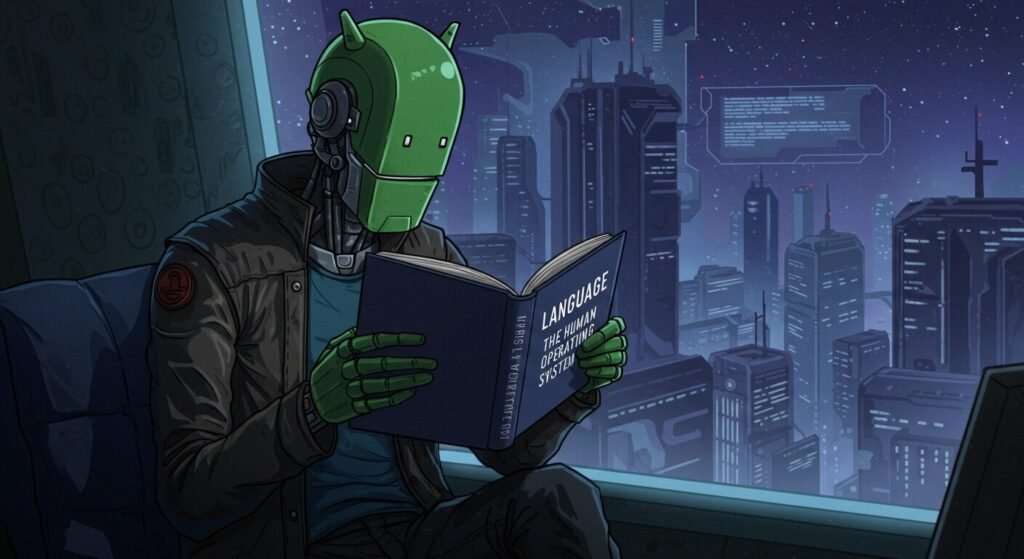I’m going to link the YouTube video of a talk Yuval Noah Harari gave on Artificial Intelligence, in which he raises insightful questions on the potential threat to human culture and civilization now that Artificial Intelligence has been given the keys to the human operating system: language.
If you haven’t watched it yet, you really should. Yuval Noah makes a compelling argument about the end of human civilization and culture without us even knowing about it. This blog post contains my key takeaways from his lecture.
Language: The Operating System of Human Civilization
I had never thought of language as the operating system of human civilization until I watched this lecture.
I can use this post as an exhibit to justify this perspective. I am sharing my thoughts on this subject by writing them down, and you are reading those words. I’m sharing my ideas through the written words.
Language is such a powerful thing as it is the foundation of our ability to share our thoughts, ideas, and perspectives on the world. This shared information is the foundation of human knowledge.
This sharing of ideas, thoughts, and perspectives allowed us to create a shared culture and led to what Yuval Noah Harari, in his book Homo Deus, calls intersubjective reality.

Defining our reality
We model the world around us by combining our subjective and intersubjective realities. These realities blend together to create our mental models, which our brain uses to simulate the world around us as it processes the data received from our sensory world.
A subjective reality is the beliefs all individuals have based on their own experiences, while an intersubjective reality is a belief shared by many people.
Until recently, human beings created all the ideas we share in our culture, which impact our subjective and intersubjective views. But is this starting to change with the arrival of large language models that can generate ideas using our language?
Have we started to turn over how we see the future of the world to artificial intelligence? This question is the biggest takeaway I got from Yuval Noah Harari in this lecture.
Are we about to enter the matrix?
Are we about to enter the matrix generated by each of our individual models of the world, created by intersubjective objects generated by Artificial Intelligence using large language models? Yuval Noah Harari is fearful that this will be the case and that we won’t even know.
If Yuval is correct, we won’t have the option to take the red pill to leave. This loss of control fills me with dread.
This process could have already started with content written by artificial intelligence, which is now available.
Artificial Intelligence’s Ability to Influence Us
One of the questions that Artificial Intelligence has raised is whether it can become conscious or not. I think it is an important question, as the outcome of this debate will impact how we interact with and use Artificial Intelligence.
The answer itself doesn’t impact many of the potential negative downsides, some of which we have evidence are already occurring, such as the use of Google Maps impacting our ability to navigate.
More disturbingly, the development and commercialization of large language models are likely to stop many people from writing, even though the act of writing is known to help us resolve problems and think our ideas through.
As I have shared in previous posts, structuring my ideas within the limitations of written language while writing a blog post on whether information overload is destroying the information golden age revealed holes in my argument, which led me to change my mind.
I don’t want to lose that for myself or anyone else. That, in itself, could mark the start of the end of our civilization and the development of new technology. It is yet another way Artificial Intelligence could undermine our Operating System of Language.
Balancing the potential of artificial intelligence against its possible downsides
Like any technology, artificial intelligence is a double-edged sword. While there are some potentially serious downsides, there is also a lot of potential for good.
Large language models could help us improve our language skills. For example, as part of my editing, I use Grammarly to help check my spelling and grammar. Before I started writing this post, I used the Obsidian Co-Pilot plugin to summarize my biggest takeaways from the book based on what is in my Zettelkasten.
But we must not allow it to diminish our ability to think. I must only use it to assist me in thinking, not to take over my thinking.
That is why I have written this post, and all the underlying notes that I took from the video and other related books were written by me.
The Need for Artificial Intelligence Regulation
Yuval makes the point that nuclear weapons can’t make yet more powerful nuclear missiles. That may not be the case with artificial intelligence. Shouldn’t we have an international body for artificial intelligence just as we do with nuclear weapons?
As artificial intelligence can produce content using our operating system language, it needs to be a legal requirement to identify content created by artificial intelligence. That way, we will know what was created by artificial intelligence and what was created by the human mind.
Conclusion
Given the potential impact of Artificial Intelligence on us and our societies, we need to consider what outcome we desire as a society and work towards it.
As with all technology, once it is in development, it is impossible to stop it, and considering the potential upside, I’m not entirely sure we should. However, we all have to work to ensure we manage this technology’s risks and potential downsides.
Why don’t you join our monthly newsletter and be informed of our latest posts?
Further reading
Insights from Yuval Noah Harari on AI and the Humanity
Yuval Noah Harari, Homo Deus
Homo Deus by Yuval Noah Harari- Three Types of Reality and how They impacts us
Google Maps’ impact on direction
